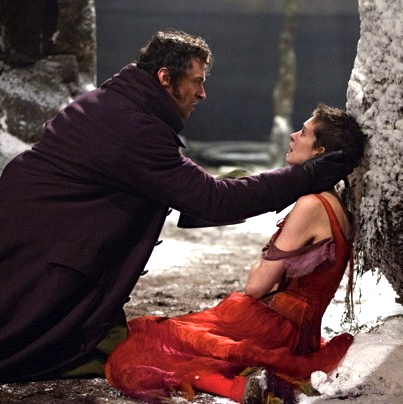Author Stacy Wolf looks at “Les Mis” through a feminist lens in the Washington Post, and isn’t impressed:
In 1987, when “Les Miz” opened on Broadway, it was part of a cultural moment that Pulitzer Prize-winning journalist Susan Faludi labeled the “anti-feminist backlash.” Its popularity at the time wasn’t surprising: The late 1980s weren’t kind to ambitious women. Television didn’t allow single mothers — such as Murphy Brown and Kate and Allie — to live successful, fulfilling lives. They all failed personally or professionally.
In contrast, “Les Miz” idealized women through the persuasive, demeaning stereotype of the martyr. Twenty-five years later, little but the packaging has changed. Given the publicity surrounding Anne Hathaway’s 25-pound weight loss, buzz haircut and IMAX-size tears, you’d think she’s the star.
Spoiler alert: She sings one big song and is dead by the film’s 43-minute mark.
Because in “Les Miz,” female characters are there only for the men to save, pity or forget. As Fantine, a hooker with a heart of gold, Hathaway does little but receive generosity from unfairly imprisoned fugitive Jean Valjean, who agrees to raise her illegitimate daughter, Cosette. Like her mother, Cosette is window-dressing — objet d’amour of Marius, a revolutionary student who wavers between his love for her and his devotion to politics. Meanwhile, Eponine, a striving girl, pines for Marius, a man beyond her station, then dies for his cause.
The women of “Les Miz” trigger the men’s ethical struggles and bravery, but they don’t actually do anything. Instead, they emote, propelling others to action….
…We understand ourselves and our identities because of the stories we’re told. When we hear the same stories about people — women, gays, the poor, Asians or African Americans — over and over, we start to believe them. If our culture tells us that women should sacrifice themselves for their children or for men’s careers, we find it unremarkable that the women of “Les Miz” do just that. We seldom notice that they’re largely invisible in a blockbuster film likely to be nominated for multiple Academy Awards.
But for anyone who thinks critically about gender, it’s unsettling.
Well. “The demeaning stereotype of the martyr”? When did martyrdom—selflessness, death to self for the sake of another, particularly one’s child— become demeaning?
Mulling this over, I think the author misses a few critical points. She fails to note that a significant part of Fantine’s tragic fate is set in motion not by mean men, but by spiteful women (her factory co-workers). She also fails to see beyond her own gender fixations to appreciate the deeper spiritual currents that carry the story along. Here’s a shock for you: “Les Miserables” is concerned with much more than gender roles. Among other things, “Les Miserables” is about redemption and mercy, commitment and fidelity. It resonates with so many around the world because it speaks to old fashioned virtues like honor, faith, integrity, courage and — spoiler alert — love. And that includes both the male and female characters—so many of whom are willing to sacrifice everything for what they believe in (or, very often, for those they love.)
Viewing this through her particular prism, Ms. Wolf perhaps finds it shocking for a woman to lay down her life for something as inconsequential and burdensome as her own child; I suspect she also can’t imagine the sense of duty that might bring a man to spend his life seeking to fulfill a vow he made to a woman. And why on earth would a man risk his own life for the sake of a little girl? Though Ms. Wolf may not realize it, the inconvenient truth is that “Les Miserables” actually pivots around women—and in particular, the women who change one man’s life, compelling him to heroism and, even, sanctity. Jean Valjean is transformed, converted, saved, through his selfless actions on behalf of Fantine and Cosette; it is ultimately Fantine who at story’s end takes his arm and leads him to his reward.
If we have reached a point where we consider that kind of gender role sexist or demeaning, something is wrong.
UPDATE: An interesting footnote to this discussion is the fact that any perceived gender stereotypes don’t appear to be keeping female audiences away from the movie:
The Hobbit may owe its continued dominance over the weekend to the sale of 3-D tickets, having been the only of the top three films to offer 3D or IMAX showings. Universal Studios claimed that women and girls accounted for more than two-thirds of the audience for Les Miserables, which has brought in $67.5 million since opening on Christmas Day.












